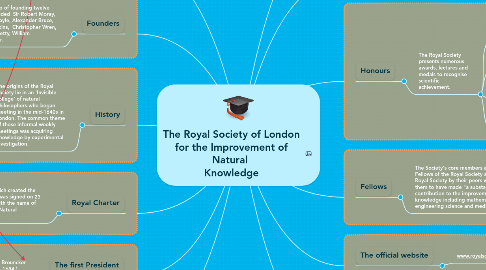The Royal Society of London for the Improvement of Natural Knowledge
Nadezhda CHにより


1. Foundation date
1.1. Its official foundation date is 28 November 1660, when a group of 12 met at Gresham College after a lecture by Christopher Wren and decided to found 'a Colledge for the Promoting of Physico-Mathematicall Experimentall Learning'.
2. Founders
2.1. The group of founding twelve men included Sir Robert Moray, Robert Boyle, Alexander Bruce, John Wilkins, Christopher Wren, William Petty, William Brouncker.
3. History
3.1. The origins of the Royal Society lie in an 'Invisible college' of natural philosophers who began meeting in the mid-1640s in London. The common theme of those informal weekly meetings was acquiring knowledge by experimental investigation.
4. Royal Charter
4.1. The first Royal Charter was signed on 15 July 1662 which created the "Royal Society of London". The second Royal Charter was signed on 23 April 1663, with the King noted as the Founder and with the name of "the Royal Society of London for the Improvement of Natural Knowledge"
5. The first President
5.1. William Brouncker ( 1620 - 1684 )
6. Accommodation
6.1. The Society found accommodation at Gresham College.
7. Motto
7.1. Nullius in verba. The Royal Society's motto 'Nullius in verba' roughly translates as 'take nobody's word for it'.
8. Publishing
8.1. The Society introduced the world's first journal exclusively devoted to science in 1665, Philosophical Transactions.
9. Honours
9.1. The Royal Society presents numerous awards, lectures and medals to recognise scientific achievement.
9.1.1. The Copley Medal is the highest award from the Royal Society of London.
9.1.2. Gabor Medal is awarded for interdisciplinary work between the life sciences with other disciplines.
9.1.3. Michael Faraday Prize is made for excellence in communicating science to UK audiences.
9.1.4. Darwin Medal is awarded for work of acknowledged distinction in evolution, population biology, organismal biology and biological diversity.
